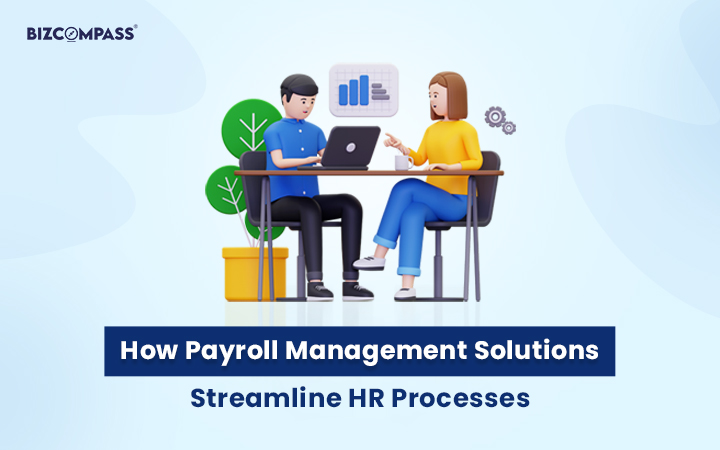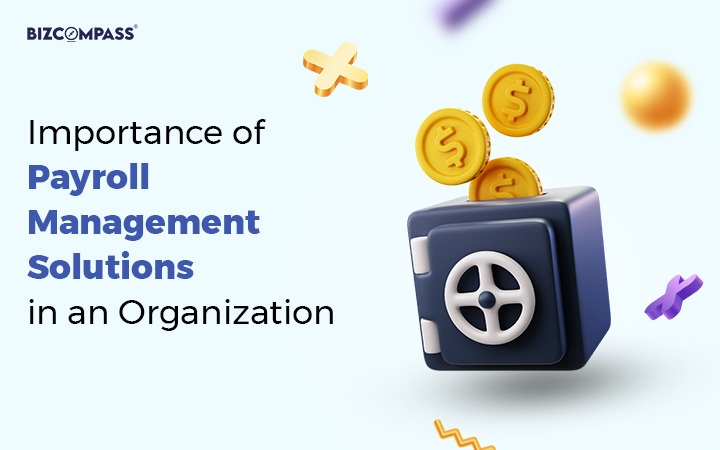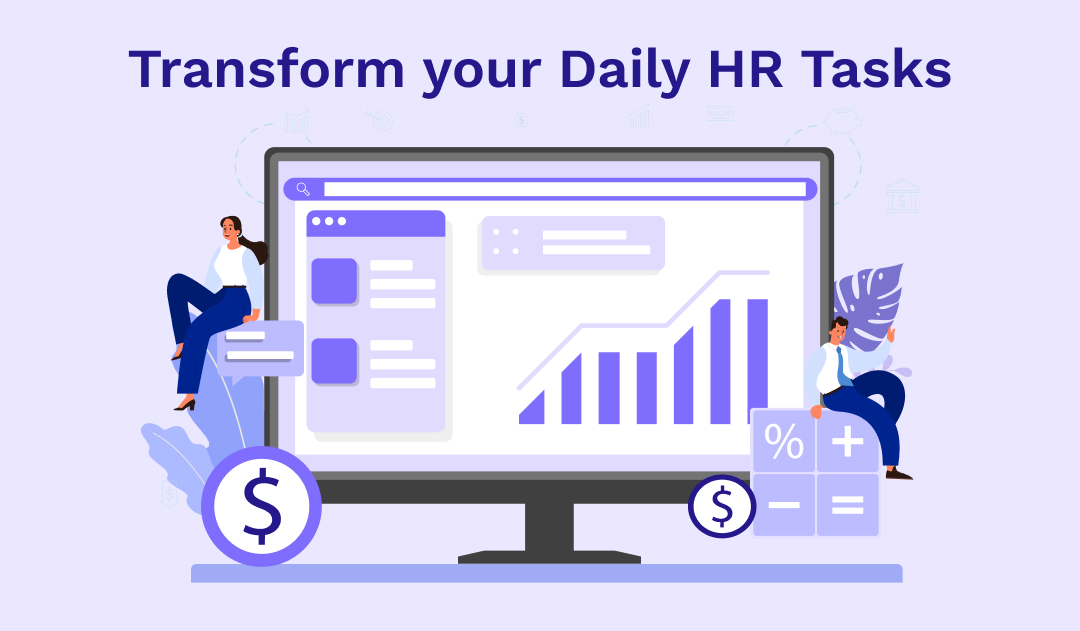Introduction
Payroll management refers to the administration of an organization's financial records related to employee salaries, wages, bonuses, deductions, and net pay. Â
It encompasses various tasks, including calculating salaries, withholding taxes, distributing payments, and maintaining accurate records of employee compensation. Â
Effective payroll management ensures timely and accurate payments to employees while complying with legal and regulatory requirements. Â
Selecting the appropriate payroll management solution is crucial for small businesses due to several reasons. Payroll management involves adherence to complex tax laws, labor regulations, and reporting requirements. Â
Choosing the right solution ensures compliance with these regulations, minimizing the risk of penalties, fines, and legal issues for small businesses. Â
Small businesses often need more resources and a workforce. Implementing an efficient payroll management solution streamlines the payroll process, saving time and reducing administrative costs associated with manual payroll processing, such as paperwork, printing, and error rectification. Manual payroll calculations are prone to errors, leading to inaccuracies in employee compensation and tax deductions. Â
An effective payroll management solution utilizes automated calculations, reducing the risk of errors and ensuring accurate payments to employees. Timely and accurate payroll processing enhances employee satisfaction and trust in the organization. Â
A reliable payroll management solution ensures that employees are paid accurately and on time, fostering a positive work environment and improving employee retention rates. Small businesses may experience growth and changes in workforce size over time. Â
A scalable payroll management solution can accommodate these changes, quickly adjusting to accommodate additional employees, changes in pay structures, or new regulatory requirements. Â Â
The right payroll management solution is indispensable for small businesses to ensure compliance, efficiency, accuracy, and employee satisfaction. Â
By choosing a suitable solution, small businesses can streamline their payroll processes, mitigate risks, and focus on their core business activities.Â
Understanding Small Business Payroll Needs
Small businesses have unique payroll needs compared to larger enterprises, primarily due to their size, budget constraints, and resource limitations. Despite variations across industries and regions, several standard payroll requirements are prevalent among small businesses. Â
Small businesses need to maintain accurate records of employee information, including personal details, employment status, tax withholding allowances, and compensation details. Â Â
This information is essential for payroll processing and compliance with regulatory requirements. Many small businesses rely on timekeeping systems to track employee attendance, work hours, overtime, and time-off requests. Integrating time and attendance data with payroll systems ensures accurate calculation of wages and adherence to labor laws. Â
Small businesses must comply with various federal, state, and local tax regulations related to payroll, including income tax withholding, Social Security, Medicare, and unemployment taxes. Â Â
Payroll systems should accurately calculate and withhold taxes while generating tax reports and filings to ensure compliance. Small businesses need efficient payment processing mechanisms to distribute salaries, wages, bonuses, and reimbursements to employees. Â
Options for payment methods may include direct deposit, paper checks, or electronic payment systems, depending on employee preferences and business preferences. Â
Some small businesses offer employee benefits such as health insurance, retirement plans, and paid time off. Payroll systems should facilitate benefits administration by accurately tracking employee contributions, deductions, and eligibility criteria. Â
Small businesses require payroll systems capable of generating comprehensive reports and analytics to monitor payroll expenses, labor costs, tax liabilities, and employee trends. Â
These insights help businesses make informed decisions and optimize payroll processes. Small companies have diverse payroll requirements encompassing employee data management, time tracking, tax compliance, payment processing, benefits administration, and reporting. Â
Understanding these requirements is essential for selecting and implementing suitable payroll solutions that meet the unique needs of small businesses while ensuring compliance, efficiency, and accuracy in payroll operations.Â
Factors To Consider When Choosing a Payroll Management Solution
01 Budget ConsiderationsÂ
Budget considerations play a significant role in selecting a payroll management solution for small businesses. Factors to consider include initial setup costs, subscription or licensing fees, ongoing maintenance expenses, and potential additional charges for extra features or support. Â
Small businesses with limited budgets may opt for cloud-based or subscription-based solutions with affordable monthly fees rather than investing in costly on-premises software. Â
It's essential to evaluate the total cost of ownership over the long term to ensure the chosen solution aligns with the business's financial resources.Â
02 Scalability and FlexibilityÂ
Scalability and flexibility are crucial factors for small businesses anticipating growth or changes in workforce size. A payroll management solution should be scalable to accommodate fluctuations in the number of employees, changes in pay structures, or expansion into markets.Â
Cloud-based solutions often offer scalability by allowing businesses to adjust their subscription plans or add-on features as needed.Â
Additionally, flexibility in customization options enables businesses to tailor the payroll system to their specific requirements, ensuring it aligns with their evolving needs and processes.Â
03 Compliance and Regulatory RequirementsÂ
Compliance with legal and regulatory requirements is paramount when choosing a payroll management solution. Small businesses must ensure that the selected solution adheres to federal, state, and local tax laws, labor regulations, and reporting requirements.Â
The payroll system should accurately calculate taxes, deductions, and withholdings while generating tax forms and reports in compliance with government regulations. It's essential to verify that the chosen solution undergoes regular updates to stay abreast of changes in tax laws and regulatory standards, reducing the risk of non-compliance and associated penalties.Â
04 Integration with Other Business SystemsÂ
Integration capabilities are essential for small businesses seeking seamless data flow between payroll and other business systems, such as accounting, human resources, time and attendance, and employee benefits management.Â
A payroll management solution that integrates with existing software applications streamlines data exchange, eliminates manual data entry errors, and enhances overall efficiency. Businesses should evaluate the compatibility and ease of integration with their existing systems, ensuring smooth interoperability and data synchronization across different departments.Â
05 User-Friendliness and Training RequirementsÂ
User-friendliness and training requirements are critical considerations, especially for small businesses with limited IT resources and personnel.Â
The payroll management solution should feature an intuitive interface, easy navigation, and straightforward functionalities to facilitate user adoption and minimize training efforts.Â
Look for solutions with comprehensive training materials, tutorials, and customer support options to assist users in mastering the system quickly.Â
Additionally, consider the availability of ongoing technical support and customer service to address any queries or issues that may arise during system usage.Â
Assessing Payroll Software Providers
Researching and comparing different payroll software providers is essential for small businesses to identify the most suitable solution for their needs. Â
Begin by compiling a list of potential providers through online research, industry publications, and recommendations from colleagues or business networks. Â
Evaluate each provider based on factors such as features, functionalities, scalability, user-friendliness, and integration capabilities. Request demos or trial versions to test the software's performance and suitability for your business requirements. Â
Additionally, consider factors like reputation, industry experience, and customer testimonials to gauge the provider's reliability and credibility. Â
Reading reviews from existing users and seeking recommendations from peers can provide valuable insights into the performance and reliability of payroll software providers. Â
Browse online review platforms, forums, and social media groups to gather feedback and opinions from businesses similar to yours. Pay attention to both positive and negative reviews to understand the strengths and weaknesses of each provider. Â
Seek recommendations from trusted colleagues, industry associations, or business advisors who have firsthand experience with payroll software solutions. Their insights can help narrow down your options and guide your decision-making process. Â
Customer support is a crucial aspect to consider when assessing payroll software providers, as timely assistance and troubleshooting are essential for smooth operations. Â
Evaluate the provider's customer support options, including availability, responsiveness, and expertise. Look for providers offering multiple support channels such as phone, email, live chat, and knowledge base resources. Inquire about service-level agreements (SLAs), response times, and support hours to ensure prompt resolution of any issues or queries. Â
Consider the provider's reputation for customer support based on reviews and testimonials from existing users. Understanding the pricing models and potential hidden costs associated with payroll software is vital to avoid unexpected expenses and budget overruns. Â
Carefully review each provider's pricing structure, including subscription or licensing fees, setup costs, add-on features, and ongoing maintenance expenses. Â
Pay attention to any hidden costs, such as fees for additional users, upgrades, data storage, or technical support beyond essential services. Request detailed pricing quotes and clarify any ambiguous terms or conditions to ensure transparency and accuracy in cost estimation. Â
Consider the total cost of ownership over the long term, including potential scalability and customization costs, to make an informed decision aligned with your budgetary constraints. Â
Assessing payroll software providers involves researching and comparing different options, reading reviews, seeking recommendations, evaluating customer support options, and understanding pricing models and hidden costs. Â
By carefully considering these factors and gathering relevant information, small businesses can select a reliable and cost-effective payroll software solution that meets their specific objectives.Â
Conclusion
To wrap it up, choosing the right payroll management solution is paramount for small businesses due to several critical reasons. Â
First and foremost, the payroll system directly impacts the accurate and timely payment of employees, which is essential for fostering trust, satisfaction, and retention among employees. Â
Additionally, an effective payroll solution ensures compliance with complex tax laws, labor regulations, and reporting requirements, minimizing the risk of penalties and legal issues for small businesses. Furthermore, the right payroll management solution enhances efficiency, reduces administrative burdens, and saves valuable time and resources, allowing small businesses to focus on their core operations and strategic objectives. Â
For small businesses embarking on the journey of selecting a payroll management solution, thorough research, careful evaluation, and strategic decision-making are imperative. Â
Begin by clearly defining your business requirements, budget constraints, and long-term objectives to guide the selection process. Â
Conduct extensive research to identify potential payroll software providers and compare their features, functionalities, pricing models, and customer support options. Â
Read reviews, seek recommendations from trusted sources, and request demos or trials to test the software's performance and suitability. Â
When evaluating payroll software providers, prioritize factors such as compliance with regulatory requirements, scalability, integration capabilities, user-friendliness, and customer support quality. Â Â
Pay close attention to pricing structures, hidden costs, and total cost of ownership considerations to ensure alignment with your financial objectives. Â
Remember that selecting the right payroll management solution is a significant investment that can yield substantial benefits in terms of efficiency, compliance, and employee satisfaction. Â
By making a well-informed decision and choosing a reliable and scalable payroll solution, small businesses can streamline their payroll processes, mitigate risks, and drive growth and success. Â
Check out Bizcompass right away if you are looking for a payroll solution for your business. It has the ideal features to help you take care of business finances with ease.Â


 >
>






